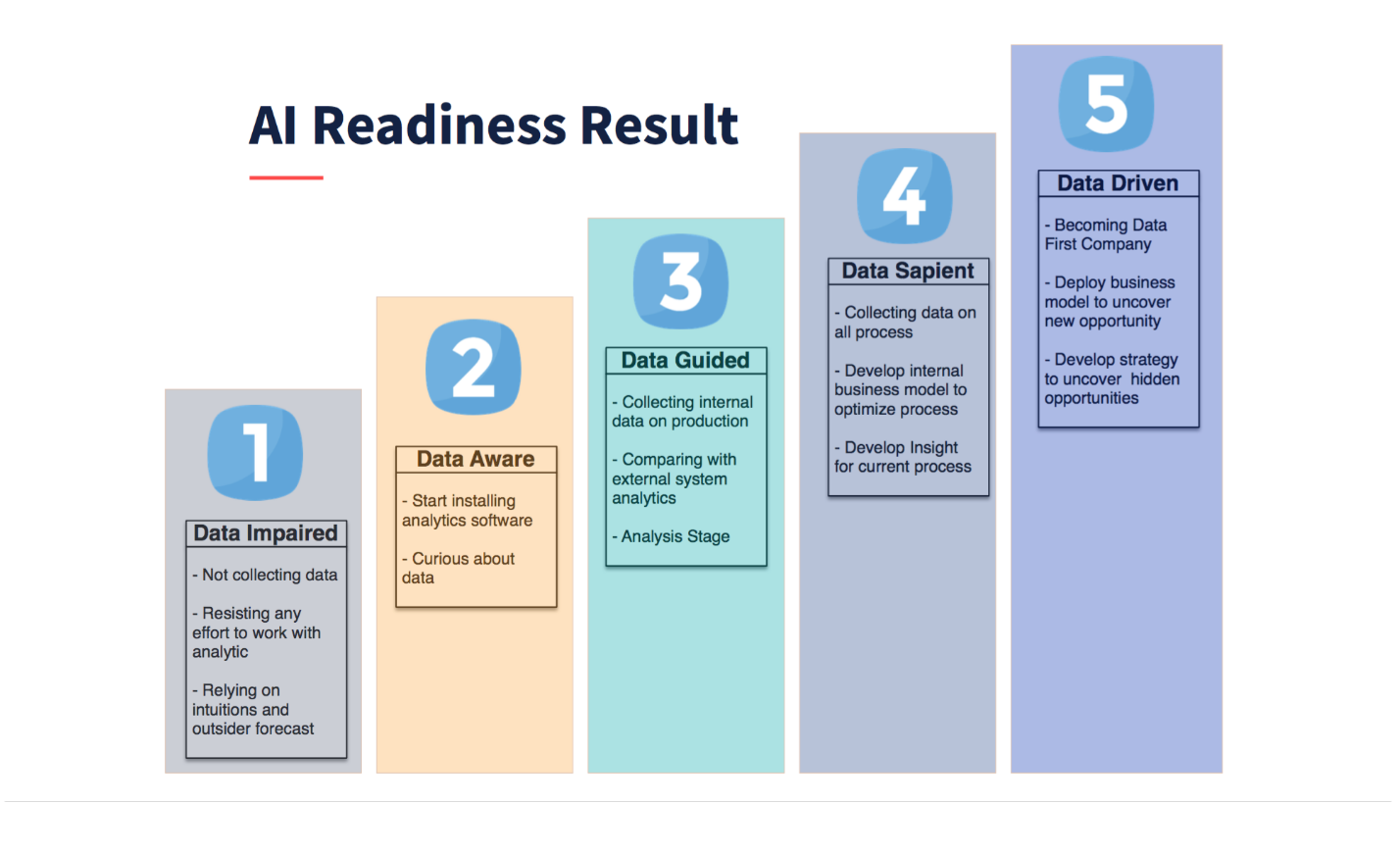To determine if your business is AI ready, it's first important to understand that the changes the AI Era is bringing are unlike anything we have seen before. What I mean by this is, a lot of tools can be easily incorporated into an existing business structure. This has been true of even the most significant business inventions of our lifetimes. Think about innovations such as typewriters and Microsoft Excel. Incorporating those kinds of new tools no doubt caused plenty of headaches, but in the end businesses were able make the adjustments and, for the most part, continue on as they had been before.
This is not true of Artificial Intelligence.
While it would be nice if someone would invent a box we can just plug in and get AI tools that will work for our businesses, I can guarantee no such box will ever exist. AI tools will do wonders for your business, but in order to get the benefits you must prepare for AI implementation.

The problem is, many small and medium-sized businesses are far from ready for AI. I have talked to many business owners who assume that one day they will suddenly just be able to start using AI. It is crucial to understand that you must prepare for AI. Prepare now, and you will be ready when you need to be. The journey to get there is truly a journey of transformation for your business.
To determine whether your company is ready to begin using AI tools, read through these roadblocks to AI readiness. In my opinion, these are the most common things holding small and medium-sized businesses back. Do you recognize any of these in your company? If so, make sure you read to the end where I offer some practical steps for how to clear these roadblocks.
External Roadblocks
Some roadblocks to a company's AI preparedness are external, having to do with the tools and systems the company is currently using to operate. Other roadblocks are internal, dealing with mindset and vision of the company. First, let's look at the external roadblocks.
No technology initiatives
The rapidly-approaching AI Era was preceded by the Internet Era. The internet alone accelerated the speed of business drastically. Too many companies, however, are not even finished adapting to the changes brought upon business by the Internet Era. Maybe they have begun to adapt, but they are still wobbly, like toddlers learning to walk. Maybe they use Microsoft Excel and certain digital tools, but a lot of the company’s processes are still manual. A company in this position cannot expect to jump into the AI era—a step beyond the Internet era—because they are already behind the curve.
Departments are siloed
The marketing department doesn’t talk to operations. Operations doesn’t talk to sales. Each department has its own kind of record-keeping system, and none of the information stored by a given department is shared with other departments. Sound familiar? To be ready for AI, this siloed structure has got to go. A single system of record is needed in order to get AI to work, and that system needs to be a single trustworthy digital database.
The dirty data problem
An AI tool is only as strong as the data it's fed. Collecting and digitizing data is the number one best thing you can do to start preparing for AI today. Keep in mind though, just because a piece of data is collected doesn’t mean it's any good to you. When an organization has inconsistent duplicated data or other dirty data problems, that organization is not ready to begin using AI. There are all kinds of ways for data to be dirty. This can be something as simple as a data point reading ".2" but it needs to be input as "0.2" You must clean up your data first, or any AI tool you try to use will produce useless results. The old computer programming saying holds especially true here: garbage in, garbage out.

High cost of Artificial Intelligence
I’m not going to sugarcoat it: AI is very costly. It’s costly in terms of dollars and it’s costly in terms of time—preparing your team, changing your business processes to be more data-driven, finding and hiring data scientists. Furthermore, the whole journey of preparing for AI implementation is by nature an experimental process, because the technology is so new. Spending a lot of time and money, especially for something so unknown, is a big challenge and a very scary endeavor. A lot of companies aren’t willing to take the financial risk at this point.
The only thing I can say to this is that this is 100 percent an investment worth making, because preparing for AI is vital to keeping your company alive in the future.
These four things alone prevent a company from moving forward with AI implementation. But even if a company is ready on the external front, there could still be internal roadblocks—deeper, more psychological challenges having to do with the mindset of the CEO or the philosophy of the way the company is run in general. These are the most common internal challenges to AI preparedness I have seen:
Internal Roadblocks
Short-term vs. long-term thinking
Making the transformation to using AI in a business is a long-term process. The return on investment is three years, minimum. A lot of companies simply think that three years is too long. Especially when running a small business, it is natural to think of everything in quarters. You might not really know what's going to happen next year. It's very hard to shift to start prioritizing something that will take years to show results, especially if you have been used to seeking instant gratification.
CEO stuck on being business guru
AI is a very new technology. Many people don’t even really know what it is, and that’s perfectly fine, because there is this great concept called asking a question. Unfortunately, many CEO’s are allergic to looking stupid and asking a basic question like, “What is AI?” It’s tragic, but this fear of looking stupid can cause a company to go down in flames. Similarly, many CEO’s are used to calling all the shots and basically operating like a guru. AI takes away that power from the CEO and gives it over to a machine that synthesizes data. This can feel like a fatal blow to the type of person who is attached to calling all the shots.
Clearing the roadblocks

The good news is that no matter where your company is in terms of AI preparedness, there are steps you can take now. Take a look at the above chart to determine where your company lands on the AI Readiness Result scale. If your company is not collecting any data at all, the first change you need to make is simply to start collecting data. Beyond that, there are ways to continue making improvements so your company is ready to take advantage of the benefits of AI.
Become data-driven
To get up to speed for doing business in the Internet Era and eventually the AI Era, it is vital to convert all manual processes to digital. The days of record-keeping with paper are long gone, and if you haven't made the shift already, it's time to make it now. AI needs data in order to function, and AI is only capable of processing data that is stored digitally. If you don't have a system of digital record keeping, AI will have nothing to go on.
Going forward, performing a regular audit on the data intake will give you vital information as well as ensure the data you are collecting is clean. Additionally, working to transform mindsets within your company so that everybody, from hourly employees to the CEO, makes decisions using data, rather than personal opinions, will create an atmosphere where AI can have an effective impact.
Replace fear of the unknown with curiosity
While we know that AI is coming, we also know that there are a lot of unknowns about it. This is very unsettling for many people. It's one thing to actively prepare for and invest in something when you know and understand what it is and what it will do for you. It's another to trust and invest time and resources into an unknown. Yet, that's exactly what companies need to do.
One way to make sure your company is prepared to face the unknown future AI is bringing is to hire people who thrive in ambiguity. When interviewing candidates, ask questions about how they approach unknown, ambiguous situations. From leadership, setting a Low Expectation, High Patience mentality will yourself and your employees permission to fail, and to make gradual progress toward AI preparedness.
Finally, create small but diverse teams within your organization. Follow Jeff Bezos' rule of thumb for the two pizza team—just enough people for two large pizzas to feed. With diverse perspectives and not too many voices clamoring in the room, maximum growth and innovation is possible.
When it comes to clearing the roadblocks to AI, it's a matter of making a difficult decision early so you don't have to make a heartbreaking one later. It's guaranteed that if you don't make the transformation, your company will not last long. The good news is, once you go through the transformation, your business will be unstoppable.